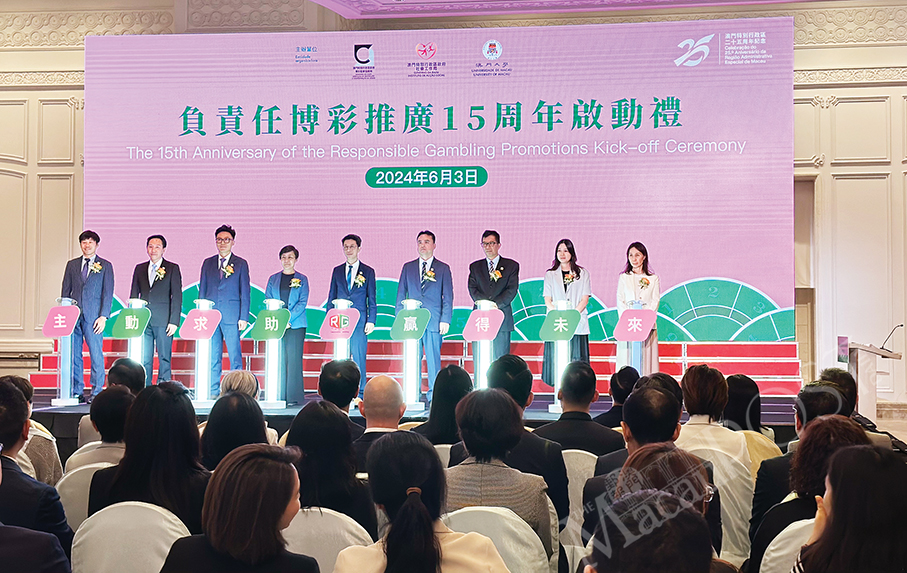2024-06-04 02:47 BY Yuki Lei Comment:1
Macau’s Central Registry System of Individuals with Gambling Disorder received in the first six months of this year a total of 21 requests for help, fewer than in the same period last year, Social Welfare Bureau (IAS) Drug Addiction and Rehabilitation Department Chief Richard Cheang Io Tat told reporters yesterday.
Yale Medicine defines gambling disorder as a condition in which gambling becomes an addiction and interferes with a person’s daily life.
The bureau did not say how many requests it received in the first quarter of last year.
In the whole of last year, according to Cheang, there were a total of 169 help-seekers, of whom 70 percent were local residents, while the remainder were non-local residents, whose cases were mostly at a level where intensive follow-up action was required, showing an increase compared with the period of the three-year COVID-19 pandemic, but which has already returned to the level of the pre-pandemic period.
Cheang also said that the bureau’s 24-hour Gambling Counselling Hotline 2832 3998 and its online counselling service receive an average of 2,500 to 2,600 requests for assistance each year, and in recent years most requests for assistance have been made online and, therefore, various measures will continue to be implemented in the future, with a view to channelling the requests for assistance made on the internet to face-to-face counselling and follow-up services.
A total of 21 requests for gambling-disorder assistance were received in the first quarter of this year, of which 20 percent were from non-local residents, Cheang said, adding that the bureau intends to step up more awareness-raising campaigns of responsible gambling among tourists in the future by enhancing cooperation with Macau’s neighbouring regions such as Hong Kong so that through an interface mechanism, visitors in need can continue to follow up on their cases after returning to their places of origin.
Cheang made the remarks after yesterday’s kick-off ceremony of the “15th Anniversary of the Responsible Gaming Promotions’’ at the Grand Lisboa Palace Resort Macau (GLP) in Cotai.
In the hope of promoting public awareness of Macau’s responsible gambling policy and the prevention and treatment of gambling disorders through different channels and at different layers, the Social Welfare Bureau, Gaming Inspection and Coordination Bureau (DICJ) and the Institute for the Study of Commercial Gaming (ISCG) at the University of Macau (UM) have co-organised a campaign entitled “15th Anniversary of the Responsible Gaming Promotions”, which started this month and will end in November. The campaign consists of 177 activities, including photo exhibitions hosted by the city’s gaming operators, responsible gambling (RG) online quiz games, and community promotional activities and seminars.
Addressing yesterday’s kick-off ceremony, IAS President Wilson Hon Wai pointed out that the prevalence rate of gambling disorder in Macau has dropped from its peak of 6 percent in 2007 to 0.45 percent in 2022; and local residents’ awareness rate of “responsible gambling” has risen from 16.2 percent in 2009 to 64.9 percent last year, showing a remarkable achievement in the concerted publicity and promotional efforts by all stakeholders in promoting responsible gaming.
Meanwhile, speaking to the media after the ceremony, Prof. Davis Fong Ka Chio, who heads the Institute for the Study of Commercial Gaming at the University of Macau (UM), pointed out that the participation of young people in online gambling has been on the rise in recent years: “In the pandemic, we found that there are several important changes, the first one being related to work from home, which enables the public to solve work problems through the internet at a distance and may lead to so-called online gambling. The second one, which usually happens in North America and Europe, but may be spreading to Asia, is that more people developed an interest in sport betting during the pandemic. The third one is that at the age of the internet, the age of mobile phones, the age of artificial intelligence (AI), more and more young people are going online.”

The “15th Anniversary of the Responsible Gaming Promotions’’ kicks off yesterday at Grand Lisboa Palace Resort Macau (GLP) in Cotai. Social Welfare Bureau (IAS) President Wilson Hon Wai (centre), Prof. Davis Fong Ka Chio (second from left), who heads the Institute for the Study of Commercial Gaming at the University of Macau, Macau Government Tourism Office (MGTO) Director Maria Helena de Senna Fernandes (fourth from left) and SJM Managing Director Daisy Ho Chiu-fung (right), among other representatives, officiate at the ceremony. – Photo: Yuki Lei
THIS IS REAL. I REPEAT, THIS IS REAL. The black mirror is real, the black mirror is really powerful, effective and 100% reliable. My name is Walter Brian, I want to thank Dada Magical for giving his black mirror to me. Since he gave me his black mirror, I became rich, successful, protected, informed and powerful. I was browsing through the internet one day when I saw multiple testimonies on how Dada Magical has helped so many people with his black mirror. I thought it was a joke at first but I gave it a try and contacted him. He sold the black mirror to me and told me how to use it and all that I need to do. I followed the instructions just as he told me and to my greatest surprise, it worked just as he told me. The black mirror is still working for me. The mirror also brings good luck, blessings and information. Contact Dada Magical now on his email; Dadablackmirrors@gmail.com and he will help you also with the black mirror just the same way he helped me. Thank you Great Dada Magical.